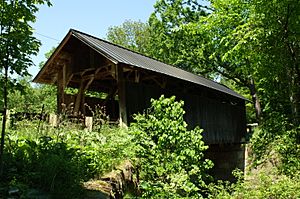Seguin Covered Bridge facts for kids
Quick facts for kids Seguin Covered Bridge |
|
|---|---|

Bridge in U.S. state of Vermont
|
|
| Carries | Automobile |
| Crosses | Lewis Creek |
| Locale | Charlotte, Vermont |
| Maintained by | Town of Charlotte |
| ID number | VT-04-02 |
| Characteristics | |
| Design | Covered, Burr arch |
| Material | Wood |
| Total length | 70.5 ft (21.49 m) |
| Width | 13.25 ft (4.04 m) |
| Number of spans | 1 |
| Clearance above | 10.1 ft (3.08 m) |
| History | |
| Constructed by | unknown |
| Construction end | ca 1850 |
|
Seguin Covered Bridge
|
|
| Area | 1 acre (0.4 ha) |
| NRHP reference No. | 74000209 |
| Added to NRHP | September 6, 1974 |
The Seguin Covered Bridge is a cool wooden bridge in Charlotte, Vermont. It crosses over Lewis Creek on Roscoe Road. This bridge was built around 1850, which makes it over 170 years old! It's special because of its unique "Burr arch" design. In 1974, it was added to the National Register of Historic Places, which means it's an important historical site.
What's in a Name?
You might see the bridge's name spelled two ways: "Seguin" (with a "G") and "Sequin" (with a "Q"). The town of Charlotte put up a sign that says "Seguin." This name comes from one of the families who owned land nearby. However, when the bridge was listed on the National Register of Historic Places, it was accidentally spelled "Sequin." This mistake has made the "Sequin" spelling quite common, even though "Seguin" is the original name.
How the Bridge Looks
The Seguin Covered Bridge is in a quiet, rural part of Charlotte. It stretches over Lewis Creek, running north to south on Roscoe Road. This bridge is a single-span bridge, meaning it crosses the creek in one big jump without any supports in the middle.
It uses a special design called a Burr arch. The bridge is about 71 feet (22 m) long and 16.5 feet (5.0 m) wide. The part where cars drive is about 13 feet (4.0 m) wide, which is just enough for one lane of traffic. The bridge sits on strong stone foundations that have been repaired with concrete.
The sides of the bridge are covered with vertical wooden boards. These boards also go inside the openings where you drive in and out. The siding stops before the roof, leaving a gap. This gap lets in some light and air.
Bridge History and Upgrades
No one knows for sure who built the Seguin Covered Bridge around 1850. It's one of only three covered bridges still standing in Charlotte. It's also one of just nine bridges in Vermont that use the Burr arch design.
The bridge has been repaired many times over the years to keep it strong and safe.
- Major repairs happened in 1949.
- More big repairs were done in 1994 by Paul Ide and Jan Lewandoski.
- A brand new roof was put on in 2001.
In 2016, the bridge had a huge upgrade. This work was important to make the bridge stronger. It even increased the weight limit for vehicles from five tons to seven tons. This means heavier cars and trucks can now cross safely.



